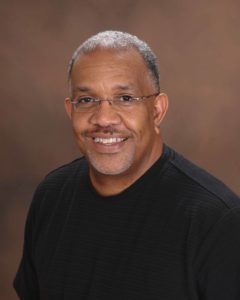We are so excited to gather once again for Humanity through Community on January 14, a summit designed to empower us to live, work, and lead in culturally responsive ways. This year’s theme is “The Myth of the Single Story,” and our keynote speaker is James (Jimmy) McGee III, founder of the Bitumen Group, President of the Impact Movement, and former Director of the Pilgrimage for Reconciliation at InterVarsity Christian Fellowship. You can learn more and register for the event here. In the meantime, here’s an interview with Jimmy McGee about his background, the work he does, and why he’s excited to join us for Humanity through Community.
For years you’ve been part of important work in the areas of reconciliation, mentorship, and facilitating dialogue that transcends difference. How does your background shape the way you approach that work?
It’s important to know both that I grew up in a two-parent black family as the oldest of four kids, because I think it’s an aberration in today’s generation to grow up with two parents in the house, and that I grew up in Chicago. Chicago is the most segregated city in the country. So racism has shaped my worldview since I was very young.
My mom and dad are present in my life to this day, so I have that instilled in my nature. But I was also nurtured by a place that was very hostile, traumatic at times. There was some hostility in the black community, in the gangs, but not as much as crossing communities by going through white neighborhoods. It was nothing to be called the N-word and to be chased. I think that’s a big part of who I am.
 Part of the hope of Humanity through Community is wondering about how we bring our unique identities into community with other unique and complex individuals. Which raises the question, who is Jimmy McGee? How would you describe your own unique identity?
Part of the hope of Humanity through Community is wondering about how we bring our unique identities into community with other unique and complex individuals. Which raises the question, who is Jimmy McGee? How would you describe your own unique identity?
Three different things come to mind. First, I am unashamedly a Christian. I met Jesus at a young age through my parents, but I didn’t have an epiphany until my 20s. Now, without a doubt, I am devoted to Jesus.
I am also unapologetically black. I love that I am black. Being black is part of celebrating God’s creation of me and in me. The truth is that I am mixed, but in a racially polarized society they only treat you as they see you.
And finally, I am fiercely multiethnic. I am intensely committed to being committed to all people. I’ve gone out of my way to establish strong bonds with Latinos, Asians, and Natives—and I’ve got a couple white friends, too. A lot of churches say they’re all about diversity in their pews, but the multiethnicity that I’m interested in is displayed Monday through Saturday outside of church walls. It’s that fierce commitment to multiethnicity that says I may oppose theologically the worldview of, say, a Muslim, but I will fight and protect their dignity as a human and as a citizen of this country.
I need all of that. My multiethnicity is strengthened by the integrity and evolving understanding that I was created in God’s image as a black man. The strength of my multiethnicity is strengthened by my commitment to being all that I am.
When you present yourself as fiercely, unapologetically committed to the various parts of your identity, what kind of pushback do you get from others?
I get it perpetually. In terms of my Christian devotion, people challenge me because they don’t think I have the intellectual acumen to really engage. On another front, evangelicalism has still yet to figure out how to engage a black man who’s not ashamed to be black. People want a black man who shrinks. They see me as this militant, Malcolm X person—he is one of my heroes, but I am not imitating him.
At the same time, most people can’t imagine that I like being around people who are diverse from me. I leverage my identity to understand the oppression of other people: Japanese internment, Indian removals and economic subjugation, stripping Latinos of every aspect of their humanity and their language. I strive to understand my identity so I can embrace other people.
I leverage my identity to understand the oppression of other people.
And that gets right at the heart of Humanity through Community. What are you looking forward to about joining us in Seattle in January?
There’s this longing in my heart. I’ve been looking for places with a strong theology that offers room for something beyond the linear, Western idea of what it means to be a Christian. I was trained as an anthropologist and learned that our faith, coming from the Middle East, is circular and dynamic. It’s not linear at all.
I’ve been reading about trauma not as the experience of pain, but the memory of pain that causes me to relive it again and again. Like Spirit and Trauma, which is helping me understand the trauma of what it means to be an oppressed minority. It give me a new appreciation that God can journey with me through trauma and toward shalom. That was an epiphany, when I was introduced to shalom theology that demonstrates God’s view of what was broken in Eden. Shalom is pregnant with justice and harmony.
So what I see in The Seattle School is a partnership. It’s giving me redemptive theology that can go with me in the communities I serve.
Do you feel like this conversation is particularly timely in the wake of the past year?
Really the past few years. I think a lot of people were lolled to sleep by this ridiculous notion that we’re in a post-racial society. When Trayvon Martin was shot, the memory of Emmett Till, the trauma of Emmett Till, rose from the ashes. The trauma of the last two years unleashes the memory of lynchings and unjust murders. And here’s the deal. To be sensitive to these issues requires a commitment to kingdom values. It requires you to empower your students to address this issue with integrity, intelligence, and fervor.
That fervor often seems to come and go, depending on what’s in the headlines and how much discouragement or despair people are feeling.
Part of the issue has always been passivity. People of color are not as afraid of neo-Nazis. What is scaring people is the passivity that allows it to exist. Something supernatural has to be inside of you to be committed to nonviolence. It takes someone greater than myself. It takes God.
I’m not interested in tickling people intellectually or cognitively. I’m hoping that I would penetrate to a visceral reality of existence, because that’s what it is for me. Being black is not just something I think about, it’s at the core of my being.
Something supernatural has to be inside of you to be committed to nonviolence.
Speaking of discouragement or despair, what keeps you moving forward?
My mentors keep me inspired. They’ve got long histories. They never fell asleep, they stayed awoke the whole time. Because of those who came ahead of me I think it’s my responsibility to keep my eyes open.
And I’m never satisfied, because we’re not there yet. We’re fighting a pernicious evil that evolves. It never stays the same. Right now it’s overt, but at times it’s extremely covert. It’s like smog that’s there even when it’s sunny. So until Jesus comes, I won’t have the opportunity to rest. And because I’m black, I don’t have a sabbath day. You don’t get a day off.
I’m happy that some people are awake now. My hope has always been in the cross. It’s never been anywhere other than that. Evil changed, evil evolved, evil was dynamic. While those who came before me were making changes, evil adjusted. So I’m planning to keep finding new colleagues along the journey. People I can contribute to and people who can contribute with me. I’m coming in January because I am genuinely hoping to create collaboration and partnership on this journey to see the kingdom come in this world.

